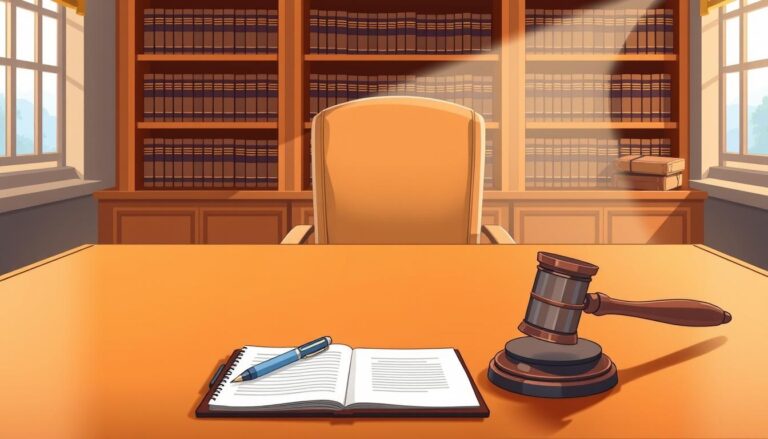Communicating Complex Legal Concepts to Clients
In the high-stakes world of law, effective client communication is key. It can make or break a lawyer’s reputation and client relationships. But how can legal professionals ensure their clients truly understand the complex concepts that underpin their cases? This article explores the essential strategies and techniques that can help bridge the gap between legal jargon and client comprehension.
Are you a lawyer struggling to convey intricate legal nuances to your clients? Discover the secrets to simplifying complex legal concepts and building trust through transparent communication.
Understanding the Importance of Clear Legal Communication
Good communication is key to a strong lawyer-client bond. When lawyers explain complex ideas clearly, they create Lawyer-Client Rapport. This also leads to Clarity in Legal Advice and Accessible Legal Communication. Such clarity greatly affects client relationships, keeps clients coming back, and boosts a firm’s image.
Impact on Client Relationships
Research shows 87% of legal pros see clear communication as vital. Yet, bad communication is linked to 72% of malpractice claims. Clear talk builds trust, making client-lawyer ties stronger and more fruitful.
Role in Client Retention
Good communication is also key to keeping clients. The 2022 Legal Trends Report found 68% of clients want lawyers to be available outside regular hours. By setting clear communication rules, lawyers meet client needs and stay happy, leading to happier clients.
Effect on Firm Reputation
A law firm’s image is shaped by how well it talks to clients. The 2022 Legal Trends Report notes bad communication can harm a firm’s image, leading to bad Google Reviews. But, lawyers who speak well and write professionally can see client satisfaction jump by up to 55%.
| Metric | Impact of Clear Legal Communication |
|---|---|
| Client Relationships | 87% of legal professionals report effective communication skills as crucial for success |
| Client Retention | 68% of clients expect lawyers to communicate outside traditional business hours |
| Firm Reputation | Improved communication can increase client satisfaction rates by up to 55% |
“Effective communication allows lawyers to build trust with clients, colleagues, and stakeholders, leading to stronger relationships and better outcomes.”
Establishing Effective Communication Channels with Clients
In the legal world, keeping strong ties with clients is key to success. Good communication is the base of these bonds. It lets lawyers grasp what clients need and offer valuable advice, building trust. Lawyers who talk clearly, quickly, and with empathy make clients feel important and heard.
One big hurdle in talking to clients is misunderstandings from not listening well enough. Lawyers need to pay close attention to what clients say and answer them properly. Using too much legal talk can also block clear communication, as clients might not get it.
To beat these hurdles, lawyers should pick the best ways to talk to clients. This might be through phone, email, text, video calls, or face-to-face meetings. By matching the communication style and method to what the client likes, lawyers can make sure their messages are clear and simple.
Technology can also make talking to clients better and easier. Good phone systems and secure online spaces can help keep communication smooth and fast. Keeping clients updated on their case and being open about any problems helps keep trust and makes clients happy.
Good client communication is more than just sharing info. It’s about building strong relationships and seeing things from the client’s point of view. By checking in with clients after a case and asking for their thoughts, lawyers can get better at talking and give a better experience.
In the end, having good ways to talk to clients is crucial for any law firm’s success. By focusing on clear, caring, and easy-to-reach communication, lawyers can strengthen their bonds with clients, improve their reputation, and grow their business.
“Effective communication is the foundation of successful client relationships in the legal industry.”
| Communication Challenge | Impact on Client Relationships | Recommended Solution |
|---|---|---|
| Lack of active listening | Misunderstandings and client dissatisfaction | Improve active listening skills and adapt communication style |
| Overuse of legal jargon | Clients feel disconnected and unable to understand | Use plain language and explain complex legal concepts in simple terms |
| Lack of clarity and conciseness | Confusion and frustration for clients | Prioritize clear, concise, and structured communication |
| Delayed or inadequate communication | Eroded trust and damaged client relationships | Ensure prompt and regular communication with clients |
Breaking Down Legal Jargon for Better Understanding
As legal professionals, we must explain complex legal ideas in simple terms. This means demystifying legal jargon and using plain language. We want our clients to understand and make informed choices.
Common Legal Terms Simplified
Legal documents often use confusing terms. Phrases like “in witness whereof” or “creditor in legalese” might puzzle many. By using simple language, we make sure our clients understand the legal matters.
Using Plain Language Effectively
- Avoid long sentences and choose short, clear ones.
- Don’t use technical jargon; use common words instead.
- Define key legal terms so clients know what they mean.
- Use examples and analogies to help explain complex ideas.
Creating Clear Written Communications
When writing for clients, like advice letters or contracts, we must consider their legal knowledge. Our goal is to make documents easy to read and understand quickly. By using plain language legal explanations, we build trust and ensure our clients are informed.
By demystifying legal jargon and using plain language, we improve our client communication. This strengthens the relationship between attorneys and clients.
Building Trust Through Transparent Communication
In the legal world, clear communication is key to building trust. Clients turn to lawyers during big moments in their lives. They count on their lawyers for advice and support. Lawyers must make sure their clients understand everything about their case.
Setting clear expectations from the start is important. Lawyers should explain what they will do, how much it will cost, and when it will happen. They should also talk about possible outcomes. This shows they are open and sets a good foundation for the relationship.
Lawyers should avoid using too much legal jargon. They should explain things in simple terms. When they make sure clients understand, it shows they care. Personal touches that go beyond the legal issue can also build trust.
Quickly answering client questions, even outside regular hours, shows they value the client’s time. This shows they are dedicated to making the client happy. Lawyers who keep learning and solving problems also gain their clients’ trust.
Lawyers who communicate clearly, keep things private, and focus on their clients’ success build strong relationships. This leads to trust and valuable advice.
“The key to building trust in the attorney-client relationship is transparent communication, where clients feel informed, heard, and supported throughout the legal process.”
| Factors Contributing to Lawyer-Client Trust | Percentage of Clients Valuing These Factors |
|---|---|
| Competence and Successful Track Record | 94% |
| Personalized Service and Empathy | 87% |
| Prompt Responses to Inquiries | 95% |
| Consistent Professionalism and Integrity | 88% |
| Cultural Competence and Inclusivity | 80% |
| Client-Centered Approach | 91% |
Communicating Complex Legal Concepts to Clients
Good communication is key to a strong lawyer-client bond. Lawyers must work hard to explain complex legal ideas clearly. They use visual aids, stories, and simple metaphors to make legal stuff easy to get.
Visual Aid Implementation
Visual tools like charts and diagrams help clients understand legal ideas better. These tools break down hard information into simple bits. About 85% of lawyers use these tools to help clients get the point.
Storytelling Techniques
Turning legal issues into stories makes them easier to remember. Around 75% of personal injury lawyers use stories to explain their cases. They compare legal ideas to everyday life, making them clearer and more relatable.
Metaphor and Analogy Usage
Metaphors and analogies are great for explaining legal stuff in simple terms. About 80% of lawyers use these to make legal terms easier. For example, they might say a contract is like a roadmap or a legal argument is like solving a puzzle.
Using these methods, lawyers can make sure clients are both informed and involved. This makes the client’s experience better and builds trust. It leads to better results for everyone.
Setting Clear Expectations from the Start
In the legal world, it’s key to set clear expectations with clients. This helps shape their experience and prevents future disappointments. It’s about setting the rules for communication, like how often to update, what to include, and where to send messages, from the very beginning.
It’s also vital to tell clients when they can reach out. Many expect to talk outside regular hours. By setting these limits early on, law firms can manage what clients expect. This makes the legal process smoother and clearer for everyone.
- Clearly define communication protocols in the engagement letter, including update frequency, preferred channels, and response times.
- Outline the availability of legal professionals and any limitations on after-hours communication to prevent unrealistic expectations.
- Manage scope creep and change requests effectively, communicating the potential impact on timelines and costs.
- Seek regular feedback and evaluate performance at the end of an engagement to identify areas for improvement.
By setting clear expectations from the start, law firms can improve Client Communication and Lawyer-Client Rapport. This leads to happier clients and more chances for them to come back. A happy client base can also boost the firm’s reputation in the competitive legal world.
| Expectation Management Best Practices | Impact on Client Satisfaction |
|---|---|
| Clearly defined communication protocols | Reduces misunderstandings and surprises |
| Transparent availability and response times | Manages client expectations and enhances trust |
| Effective scope and change management | Prevents delays, cost overruns, and conflicts |
| Seeking regular feedback and evaluation | Provides valuable insights for future improvements |
By setting clear expectations from the start, law firms can lay a solid foundation for Client Communication and Lawyer-Client Rapport. This improves the client experience and boosts the firm’s reputation in the legal field.
Developing Active Listening Skills for Legal Professionals
In the legal world, clear communication is key. Lawyers need to listen actively. This means more than just hearing what clients say. It’s about really getting what they mean, finding the real issues, and answering them well.
Understanding Client Concerns
Lawyers must listen carefully to their clients. They should avoid interrupting and stay focused. By listening well, they can understand the client’s needs, goals, and problems better. This helps lawyers give advice that’s right for the client.
Reading Non-verbal Cues
Good Lawyer-Client Rapport also means noticing non-verbal signs. A client’s body language, facial expressions, and voice can tell a lot. Lawyers who are good at this can understand how the client feels and what they don’t get. They can then respond in a way that helps.
Providing Appropriate Feedback
Listening actively is a two-way street. Lawyers need to give feedback that shows they get what the client is saying. This might mean summarizing important points, asking for more information, or showing empathy. Giving Effective Client Explanations builds trust and makes the client feel understood and supported.
By improving their listening skills, lawyers can better understand what clients need. This leads to stronger relationships and more effective legal help. It also makes clients happier, helps achieve better results, and boosts the law firm’s reputation.
Leveraging Technology for Better Client Communication
In the legal world, talking to clients well is key. It builds trust, keeps clients happy, and boosts a lawyer’s reputation. Technology helps a lot in this area. It makes Client Communication better and legal services more Accessible Legal Communication.
Automated client intake forms are a big help. They cut down on mistakes and make sure client info is right. This makes the start of working with a client smoother and more open.
Low-code business apps also play a big role. They connect different software and tools. This makes talking to clients clearer and more organized.
| Metric | Impact |
|---|---|
| Time to complete intake process | Reduced by automating data collection |
| Accuracy of information collected | Improved by minimizing manual entry errors |
| Client satisfaction rates | Increased due to a more streamlined and convenient experience |
Legal client portals are another important tool. They offer secure ways to share documents, chat, manage tasks, and schedule meetings. This makes things more efficient and keeps clients involved.
As law firms use more tech, they’ll see big improvements. They’ll talk to clients better and make legal services more accessible. This will make clients happier and boost lawyers’ reputations.
Emotional Intelligence in Legal Communication
Emotional intelligence is key in legal talks. It means knowing and handling your feelings and understanding your clients’. Lawyers with high emotional intelligence build strong Lawyer-Client Rapport and explain things clearly in tough legal cases.
Empathy in Client Interactions
Empathy is a big part of emotional intelligence in law. Lawyers who get their clients’ feelings build trust and open communication. They help clients feel understood, leading to better results.
Managing Difficult Conversations
Legal issues can be emotionally tough, like divorce or criminal defense. Emotional intelligence is crucial here. Lawyers who manage their feelings well can handle tough talks better. They listen well, give good feedback, and find ways to solve problems.
Getting better at emotional intelligence takes time, but it’s worth it. Lawyers who are emotionally smart have stronger Lawyer-Client Rapport, explain things better, and get better results.
“Emotional intelligence is a key differentiator for successful lawyers in today’s legal landscape. It’s not just about legal expertise – it’s about understanding and connecting with clients on a deeper level.”
Creating Effective Written Legal Communications
In the legal field, making clear and brief written messages is key. Good client advice letters help answer questions, explain legal options, and record the current legal situation. Legal pros must think about the purpose, who it’s for, what it covers, and its tone.
Using Legal Terminology Simplification is crucial. Lawyers should explain things in Plain Language Legal Explanations that clients can get. This way, they can understand better and trust their lawyers more.
- Write in a style that fits the client’s background and legal knowledge.
- Use a friendly tone that clients can relate to, not too formal.
- Keep it short and to the point, focusing on what matters most to the client.
- Check for mistakes to make sure the message is clear and correct.
By focusing on Legal Terminology Simplification and Plain Language Legal Explanations, lawyers can make messages that are clear, easy to understand, and engaging. This helps clients understand better, builds stronger relationships, and helps the legal practice succeed.
“The true essence of legal writing is not merely presenting information, but translating complex concepts into clear, concise language that clients can comprehend.”
https://www.youtube.com/watch?v=AfpS-SV3de4
Maintaining Professional Boundaries While Being Accessible
Lawyers must find a balance between being available and keeping professional boundaries. This balance is key to good client communication. It means setting clear rules for talking and managing what clients expect.
Even though clients might want to talk anytime, lawyers need to set limits. This helps them keep a good work-life balance. By telling clients when they can expect a reply, lawyers can meet their needs without sacrificing their own well-being.
Being professional doesn’t mean you’re unreachable. It’s about having a clear plan for talking that works for both sides. This includes choosing the best way to communicate, how long it takes to respond, and what the lawyer can do for the client.
Source Links
- How do you explain complex legal and technical concepts to clients in an understandable way?
- How To Explain Complex Legal Concepts To Your Clients. – Conventus Law
- Communication Strategies for Lawyers: A Comprehensive Guide – RunSensible
- A Guide to Better Law Firm Client Communication
- Effective Communication Skills for Lawyers: Enhancing Clarity and Persuasion
- 10 Effective Tips to Improve Law Firm Client Communication – ULTATEL Blog
- Mastering Law Firm Client Communication (2024) – Lawyerist
- Understanding legalese a practical guide for 2024 | fynk
- plainlanguage.gov | Avoid jargon
- How Can Law Firms Build and Maintain Trust With Clients? | Gierach Law Firm
- Building Trust: 3 Essential Steps for Attorneys
- Elevating Client Service for Attorneys: Building Trust, Loyalty, and a Thriving Practice
- How Can Clients Be Educated On Complex Legal Issues for Informed Decision-Making? – Lawyer Magazine
- How do you ensure that you communicate complex legal concepts clearly and effectively to non-legal stakeholders?
- How Law Firms Can Improve the Way They Communicate with Clients – Pepper Virtual Assistants
- 5 practical ways to manage client expectations as a lawyer
- Client Communication Protocol Checklist
- 5 Ways to Improve Communication Skills for Lawyers | Smith.ai
- The Importance of Effective Communication Skills for Lawyers | Skill Success Blog
- Leveraging Technology to Improve Client Intake Processes – RunSensible
- How Legal Client Portals Can Benefit Your Law Firm
- Effective Communication Strategies During Litigation – Attorney Aaron Hall
- The role of Emotional Intelligence in Effective Communication [5 Roles]
- Mastering Legal Writing: Tips for Clear and Persuasive Communication » Alameda County Bar Association
- Building a Strong Legal Practice with Effective Client Communication
- Boundaries
- Boundary Setting in Communication: 5 Ways to Say No with Respect







